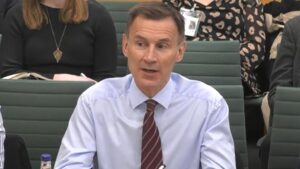<?xml encoding=”utf-8″ ?????????>
UK households are facing an average tax rise of £3,500 a year by the next election, the country’s leading economics thinktank has said – the biggest increase over a parliament on records dating back more than 70 years.
The Institute for Fiscal Studies (IFS) said that on current forecasts the Conservatives were on track to raise £100bn more annually by 2024 than if taxes as a share of national income had stayed the same as in 2019.
In a damaging report for Rishi Sunak as the Tory party faces growing internal divisions over the issue, the thinktank said tax revenue was on track to amount to about 37% of national income in 2024, up from about 33% four years ago.
Compared with a world in which that shift had not occurred, the IFS said this amounted to an additional £100bn a year for the exchequer – the equivalent to about £3,500 more per household, although some would pay more and others less.
Meanwhile, Sunak is preparing to head to Manchester this weekend for one of the most challenging Tory party annual conferences in years. He is under pressure from rightwing MPs and supporters of his predecessor Liz Truss to launch a package of pre-election tax giveaways.
However Jeremy Hunt has already said that little room for tax cuts if he wants to meet the government’s self-imposed targets for the public finances without renewed cuts to public spending.
In analysis that is likely to stoke fresh Tory infighting, the IFS said no parliament had presided over a bigger increase in taxes than the current one – led by three Conservative prime ministers – on records dating back to 1951.
Before the 2019 general election, the Conservatives claimed Labour’s spending plans under Jeremy Corbyn would mean an additional £2,400 bill for every taxpayer in Britain.
Under Keir Starmer, Labour has seized on rising tax levels as evidence of the Tories’ failure to grow the economy, arguing the government is in a bind of its own making, as sluggish economic growth brings in less income for the exchequer to fund public services.
Aiming to demonstrate economic competence before the next election, the shadow chancellor, Rachel Reeves, has ruled out introducing a wealth tax or putting up the top rate of income tax. However, Labour faces its own internal pressures to overhaul taxation to fund the repair of austerity-starved public services while also tackling entrenched inequalities.
In separate research published on Friday, a report from the Resolution Foundation thinktank and the innovation charity Nesta’s UK 2040 Options programme warned stark wealth inequalities were holding Britain back.
Arguing that changes to wealth tax were a “no-brainer”, the report found total wealth for the richest 10% of people in the UK had grown 25 times faster than for the poorest 30% between 2006 and 2020.
Sarah Olney, the Liberal Democrat Treasury spokesperson, said the Tories had crashed the economy, with the public paying the price. “This is the same party which promised not to raise people’s taxes and is now taxing families through the nose,” she said.
The IFS said a series of taxation-raising measures had fuelled the record growth in tax revenue as a share of national income. Highlighting decisions Sunak took during his time as chancellor, the thinktank pointed to a rise in the headline rate of corporation tax from 19% to 25%, the energy profits levy and the freezing of various income tax and national insurance thresholds.
Ben Zaranko, a senior research economist at IFS, said that while high by historical standards, the UK’s tax take as a share of national income was still “fairly middling” compared with other developed countries.
Even if the government decided to announce tax cuts in the run-up to the next election, there would still be “no world in which this parliament, or indeed the period since Rishi Sunak became prime minister”, turned out to be “anything other than a tax-raising one”, Zaranko said.
He added: “This is not, for the most part, a direct consequence of the pandemic. Rather, it reflects decisions to increase government spending, in part driven by demographic change, pressures on the health service and some unwinding of austerity.
“It is likely that this parliament will mark a decisive and permanent shift to a higher-tax economy.”
A spokesperson for the Treasury said that “despite needing to take the difficult decisions to restore public finances” after the Covid pandemic and Russia’s invasion of Ukraine, the UK’s ratio of tax to gross domestic product would still remain lower than any major European economy.
“Driving down inflation is the most effective tax cut we can deliver right now, which is why we are sticking to our plan to halve it, rather than making it worse by borrowing money to fund tax cuts.”
